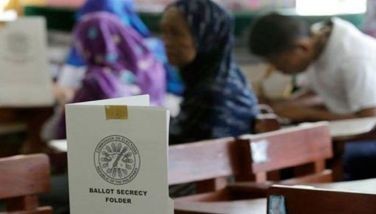Lifestyle check ordered for Cabinet, other execs

October 23, 2002 | 12:00am
Grafters, repent and correct your ways.
The admonition came from President Arroyo, who ordered the Presidential Anti-Graft Commission (PAGC) yesterday to conduct a lifestyle check on top government officials — from Cabinet members down to bureau directors — to see if they are living within their means.
Mrs. Arroyo was stung by the results of the latest survey conducted by London-based Transparency International that ranked the Philippines as the 11th most corrupt among 102 nations.
Heads of government-owned and controlled corporations as well as ranking police and military officials will be included in the lifestyle check.
The Philippine National Police and the Armed Forces of the Philippines are considered bureaus of the Department of the Interior and Local Government and Department of National Defense, respectively.
"Starting next week, we shall launch a campaign to foster honesty in public service, reward dedication and fidelity to service, and sanction government officials and employees discovered with amassed wealth and property beyond their means or who visibly live in affluence when their circumstances do not warrant such luxury," the President announced during a visit to Argao, Cebu yesterday. "I call the perpetrators of graft to change, to repent and to correct their ways."
She said she was "ready to sacrifice until I’m able to clean up our bureaucracy."
"The Filipino masses are with me in this campaign and we shall celebrate the removal, charging in court and sending to jail thieves in both suit and barong," the Chief Executive said. "I have cited the need for honest service because I am getting concerned about news reports about the anomalies taking place around us. Where they are true or not, including familiar complaints about officials and employees who live in luxury and in excess of their salaries or status in life."
To see if a government official is living within his means, the anti-graft commission has been authorized to inspect the official’s homes, properties and businesses.
The commission will also check the veracity of his financial statements, filed with the Civil Service Commission as required by law.
Mrs. Arroyo, however, added the public "should not expect prosecution and convictions overnight" because results would take time.
"Due process will be observed in the course of the drive," she said. "The effort will be laborious but will be focused and determined. Let’s strengthen honesty and fidelity in public service. We shall reward those who serve our people in straight and clean service. We shall punish those who cheat and commit anomalies."
According to the latest survey of 102 countries by Transparency International, a global coalition against corruption, the Philippines ranked 11th in corruption.
Malacañang challenged the findings. "We would like Transparency International to be transparent. We’re not sure about their methods, the questions used in the survey," Press Secretary Ignacio Bunye said.
In an interview with foreign correspondents in early July, US Ambassador Francis Ricciardone said the Philippines was losing out to other countries in luring foreign investors because of massive corruption in the judiciary and in the government.
Upon assuming office in 2001, Mrs. Arroyo pledged to root out corruption, a serious problem that hounded past administrations.
In January 2001, Mrs. Arroyo’s predecessor, Joseph Estrada, was ousted in a military-backed popular protest after he was accused by an estranged drinking buddy of taking bribes from illegal gambling bosses, misusing state funds and profiting from insider trading.
Arrested last year, Estrada is now detained in a military hospital and currently on trial for plunder, a charge that carries the death penalty.
In the Transparency International survey, the Philippines shared the 11th spot with such countries as Pakistan, Romania and Zambia, only ten notches away from Bangladesh which was tagged as the most corrupt nation in the world.
Transparency International surveyed business people and risk analysts on their perceptions in the degree of corruption. A score of 10 in the Corruption Perception Index (CPI) meant that the nation was perceived as "clean" while a score of zero meant it was seen as highly corrupt.
In the 2002 survey, Finland emerged as the most corruption-free country, scoring 9.7 points on the 10-point scale. In contrast, Bangladesh got a 1.2 score while the Philippines got 2.6.
The Philippines slipped from the CPI score it had in 2001 and its overall ranking slid from No. 65 in 2001 to No. 77 in the 2002 survey.
Transparency International had a total of 15 surveys used by nine independent institutions. To be included in the CPI rankings, at least three surveys had to be administered to locals and expatriates in a country.
Transparency International explained that its definition of corruption involved the abuse of "public office for private gain." The questions asked included the misuse of public power for private benefit with a focus on bribe-taking of government officials.
Transparency International also publishes the Bribe Payers Index which ranked exporting countries according to their propensity to offer bribes.
"It appears that we slid in the ranking. That is the perception in doing business with our agencies. It means we are not addressing enough these corruption incidences," said Judge Dolores Español, Transparency International Philippines president.
Earlier, Procurement Watch Inc. estimated that the Philippines loses P21 billion a year to corruption in the procurement of government goods and services alone.
Procurement Watch program director Kristina Pimentel said about 15 percent of the cost of all government contracts is lost to corruption.
Procurement Watch and Transparency International are both lobbying for the passage of a bill that would improve transparency in government, improve competition and limit discretion in public biddings for government contracts.
Dubbed as the Government Procurement Reform Bill, the proposal was intended to substantially shorten the time spent on procurement with the bidding for goods estimated to be reduced to less than three months from the current seven.
The admonition came from President Arroyo, who ordered the Presidential Anti-Graft Commission (PAGC) yesterday to conduct a lifestyle check on top government officials — from Cabinet members down to bureau directors — to see if they are living within their means.
Mrs. Arroyo was stung by the results of the latest survey conducted by London-based Transparency International that ranked the Philippines as the 11th most corrupt among 102 nations.
Heads of government-owned and controlled corporations as well as ranking police and military officials will be included in the lifestyle check.
The Philippine National Police and the Armed Forces of the Philippines are considered bureaus of the Department of the Interior and Local Government and Department of National Defense, respectively.
"Starting next week, we shall launch a campaign to foster honesty in public service, reward dedication and fidelity to service, and sanction government officials and employees discovered with amassed wealth and property beyond their means or who visibly live in affluence when their circumstances do not warrant such luxury," the President announced during a visit to Argao, Cebu yesterday. "I call the perpetrators of graft to change, to repent and to correct their ways."
She said she was "ready to sacrifice until I’m able to clean up our bureaucracy."
"The Filipino masses are with me in this campaign and we shall celebrate the removal, charging in court and sending to jail thieves in both suit and barong," the Chief Executive said. "I have cited the need for honest service because I am getting concerned about news reports about the anomalies taking place around us. Where they are true or not, including familiar complaints about officials and employees who live in luxury and in excess of their salaries or status in life."
To see if a government official is living within his means, the anti-graft commission has been authorized to inspect the official’s homes, properties and businesses.
The commission will also check the veracity of his financial statements, filed with the Civil Service Commission as required by law.
Mrs. Arroyo, however, added the public "should not expect prosecution and convictions overnight" because results would take time.
"Due process will be observed in the course of the drive," she said. "The effort will be laborious but will be focused and determined. Let’s strengthen honesty and fidelity in public service. We shall reward those who serve our people in straight and clean service. We shall punish those who cheat and commit anomalies."
According to the latest survey of 102 countries by Transparency International, a global coalition against corruption, the Philippines ranked 11th in corruption.
Malacañang challenged the findings. "We would like Transparency International to be transparent. We’re not sure about their methods, the questions used in the survey," Press Secretary Ignacio Bunye said.
In an interview with foreign correspondents in early July, US Ambassador Francis Ricciardone said the Philippines was losing out to other countries in luring foreign investors because of massive corruption in the judiciary and in the government.
Upon assuming office in 2001, Mrs. Arroyo pledged to root out corruption, a serious problem that hounded past administrations.
In January 2001, Mrs. Arroyo’s predecessor, Joseph Estrada, was ousted in a military-backed popular protest after he was accused by an estranged drinking buddy of taking bribes from illegal gambling bosses, misusing state funds and profiting from insider trading.
Arrested last year, Estrada is now detained in a military hospital and currently on trial for plunder, a charge that carries the death penalty.
In the Transparency International survey, the Philippines shared the 11th spot with such countries as Pakistan, Romania and Zambia, only ten notches away from Bangladesh which was tagged as the most corrupt nation in the world.
Transparency International surveyed business people and risk analysts on their perceptions in the degree of corruption. A score of 10 in the Corruption Perception Index (CPI) meant that the nation was perceived as "clean" while a score of zero meant it was seen as highly corrupt.
In the 2002 survey, Finland emerged as the most corruption-free country, scoring 9.7 points on the 10-point scale. In contrast, Bangladesh got a 1.2 score while the Philippines got 2.6.
The Philippines slipped from the CPI score it had in 2001 and its overall ranking slid from No. 65 in 2001 to No. 77 in the 2002 survey.
Transparency International had a total of 15 surveys used by nine independent institutions. To be included in the CPI rankings, at least three surveys had to be administered to locals and expatriates in a country.
Transparency International explained that its definition of corruption involved the abuse of "public office for private gain." The questions asked included the misuse of public power for private benefit with a focus on bribe-taking of government officials.
Transparency International also publishes the Bribe Payers Index which ranked exporting countries according to their propensity to offer bribes.
"It appears that we slid in the ranking. That is the perception in doing business with our agencies. It means we are not addressing enough these corruption incidences," said Judge Dolores Español, Transparency International Philippines president.
Earlier, Procurement Watch Inc. estimated that the Philippines loses P21 billion a year to corruption in the procurement of government goods and services alone.
Procurement Watch program director Kristina Pimentel said about 15 percent of the cost of all government contracts is lost to corruption.
Procurement Watch and Transparency International are both lobbying for the passage of a bill that would improve transparency in government, improve competition and limit discretion in public biddings for government contracts.
Dubbed as the Government Procurement Reform Bill, the proposal was intended to substantially shorten the time spent on procurement with the bidding for goods estimated to be reduced to less than three months from the current seven.
BrandSpace Articles
<
>
- Latest
- Trending
Trending
Latest
Trending
Latest
Recommended




























